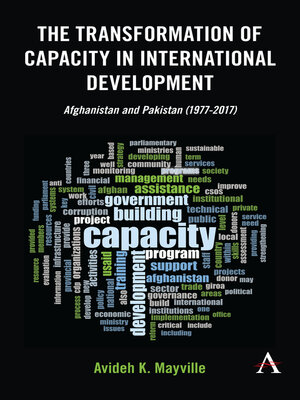The Transformation of Capacity in International Development
ebook ∣ Afghanistan and Pakistan (1977–2017) · Anthem Sociological Perspectives on Human Rights and Development
By Avideh K. Mayville

Sign up to save your library
With an OverDrive account, you can save your favorite libraries for at-a-glance information about availability. Find out more about OverDrive accounts.
Find this title in Libby, the library reading app by OverDrive.



Search for a digital library with this title
Title found at these libraries:
| Library Name | Distance |
|---|---|
| Loading... |
"The Transformation of Capacity in International Development" exposes the transformation of capacity within the development discourse through a discursive analysis of USAID projects in Afghanistan and Pakistan between 1977 and 2017. As development agendas increasingly call for human rights approaches to development and the foreign policies of donor states sound alarms over global security threats, capacity development has emerged as the solution to the complex problem of development. Through this examination of USAID's attempts to build capacity in Afghanistan and Pakistan, the book exposes how Western notions of progress, constructed by institutions, government offcials, scholars and private sector actors, are obscured by the transformation of capacity. As agendas are translated into projects, they perpetuate historical relationships of global inequality that have corrupted and compete with indigenous models of governance. The Transformation of Capacity in International Development has implications for those considering the future of human rights–based approaches to development, the international management of global security threats and the sustainability of donor investments.
|"The Transformation of Capacity in International Development" examines the transformation of capacity as a concept within the global development agenda through an analysis of USAID projects and policy in Afghanistan and Pakistan between 1977 and 2017. It traces the evolution of donor discourses from the Cold War through the Global War on Terror, exposing the tensions within donor agendas between market, human rights and security-based narratives and discourses. As the global development agenda subsumes major areas of international debate defined by competing objectives, these tensions are absorbed, obscured and depoliticized with the transformation of capacity.
The transformation of capacity unveils donor approaches to building capacity as a form of statemaking, involving development projects as a tactic for building networks between centralized, national spaces (accessible and held accountable to the "international community" of states) and subnational environments harboring transnational militant threats to global security. Through an examination of the USAID example, this book exposes how the donor attempt to develop the capacity of "fragile" states and to manage transnational militancy reveals a fundamental struggle over the ownership and future of global governance and development.







